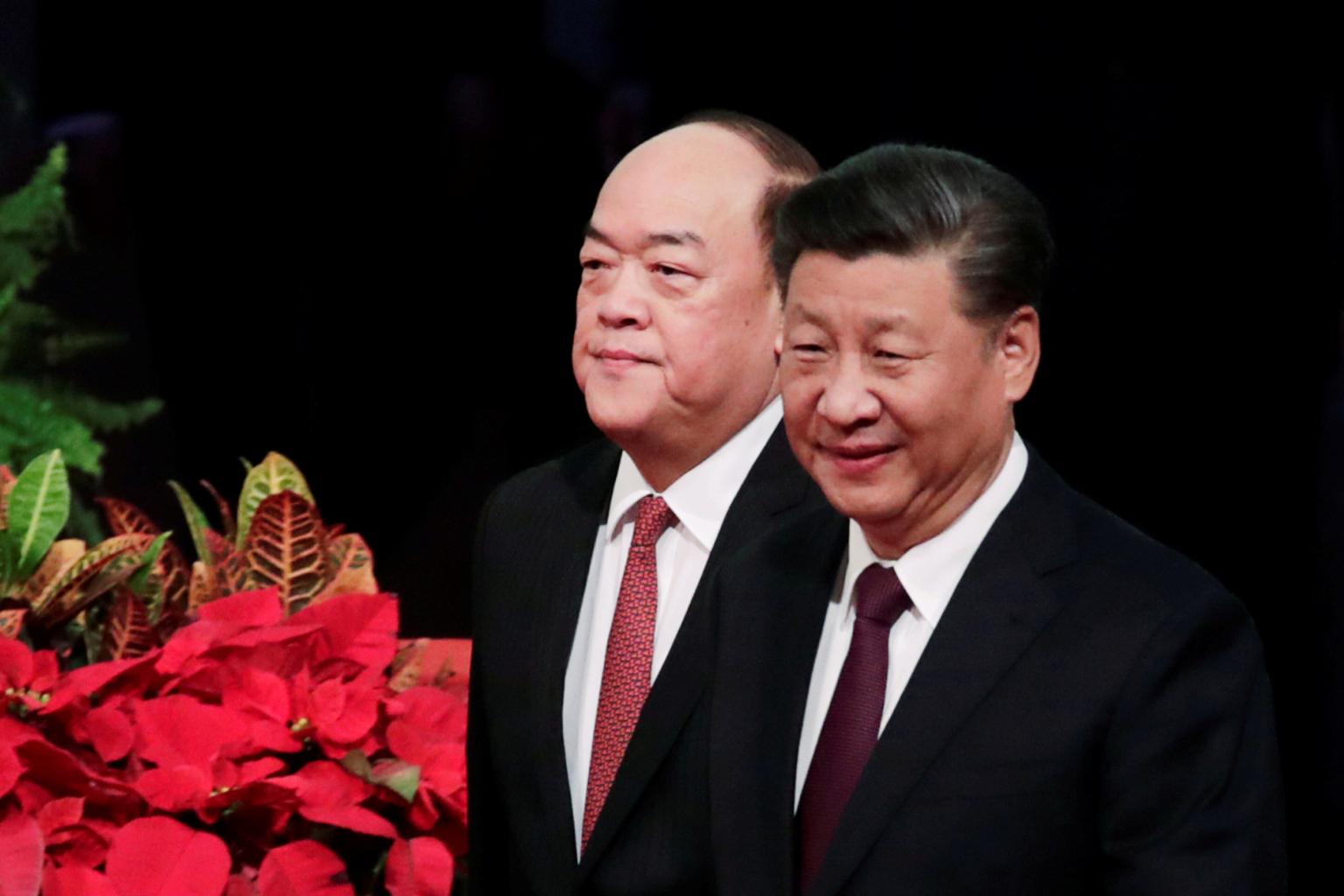Hands off Hong Kong and Macau, Chinese President Xi Jinping tells foreign countries
Sign up now: Get ST's newsletters delivered to your inbox

Chinese President Xi Jinping (right) and Macau's new Chief Executive Ho Iat Seng at a ceremony to inaugurate the fifth-term government of the Macau Special Administrative Region on Dec 20, 2019.
PHOTO: REUTERS
Follow topic:
BEIJING - President Xi Jinping warned foreign countries that China would not tolerate interference in Hong Kong and Macau, as he swore in the gambling hub's new Chief Executive and government in a ceremony on Friday (Dec 20).
China's top leader also lavished praise on what he said was Macau's successful implementation of the "one country, two systems" governing framework, pointing out in his speech that the most important reason for this was patriotism in its people.
While Mr Xi did not reference anti-government protests directly, analysts said his speech, delivered in Macau that is just an hour's ferry ride from Hong Kong, was aimed squarely at the restive city.
"I want to emphasise that since Hong Kong and Macau's return to the motherland, handling the affairs of these two Special Administrative Regions is entirely China's internal affairs, it is not the business of foreign forces," he said.
Beijing has repeatedly blamed foreign countries such as the United States for fanning protests in Hong Kong, which first broke out in early June.
"We will never tolerate any foreign forces interfering in Hong Kong and Macau affairs," said Mr Xi.
The Chinese President is in Macau for a three-day visit to attend celebrations for the 20th anniversary of Macau's handover to China. He also officiated the inauguration of its new Chief Executive Ho Iat Seng on Friday, the last day of his visit.
The visit is widely seen as a reward for Macau's good behaviour compared to Hong Kong.
A former Portuguese colony, Macau returned to Chinese rule in Dec 20, 1999, while Hong Kong did so on July 1, 1997. Both are governed under the "one country, two systems" arrangement, which grants each region a high degree of autonomy in return for their recognition of "one country".
Mr Ho said in a speech after he was inaugurated that Macau was a "successful example" of "one country, two systems", adding that his administration would strengthen patriotic education among youth and public servants so that this success would continue.
"At this moment, I deeply understand that the great motherland will always be the strong backing of Macau," he said.
Mr Xi said later in his speech that patriotism was the most important reason for Macau's success.
"The majority of Macau compatriots have a patriotic tradition, a strong sense of national identity, belonging and national pride. This is the most important reason for the successful implementation of 'one country, two systems' in Macau," he added.
He also praised Macau for successfully passing national security legislation under Article 23 of its Basic Law in 2009, safeguarding the central government's "comprehensive right of governance". Hong Kong's attempt to pass similar legislation was shelved in 2003 after mass demonstrations broke out.
Mr Xi was widely expected to announce policies to diversify Macau's gaming dependent economy, but while he said this should be the direction of the city's development, he did not go into specifics. Instead, he said Macau's government must address people's concerns pertaining to housing, healthcare and retirement.
Beijing has linked the protests in Hong Kong to deep-seated anger over issues related to unaffordable housing and other economic factors.
Veteran Macau lawmaker Jose Coutinho said he expected the new Chief Executive to be "pragmatic" in solving these deep-rooted issues.
But he added that "many things that Mr Xi talked about were (meant) for Hong Kong".
"We are not dependent on foreign countries because we are self-sufficient, most of our revenues come from mainland gamblers... I consider foreign interference in Macau to be non-existent."
Professor Lau Siu Kai, vice-president of the Chinese Association of Hong Kong and Macau Studies, said the speech was a clear signal to Hong Kong, and a warning to its "opposition forces" not to gang up with foreign forces against the mainland.
"It tells Hong Kong that if it respects 'one country', then like Macau, it can also prosper under 'one country, two systems'," he said.

